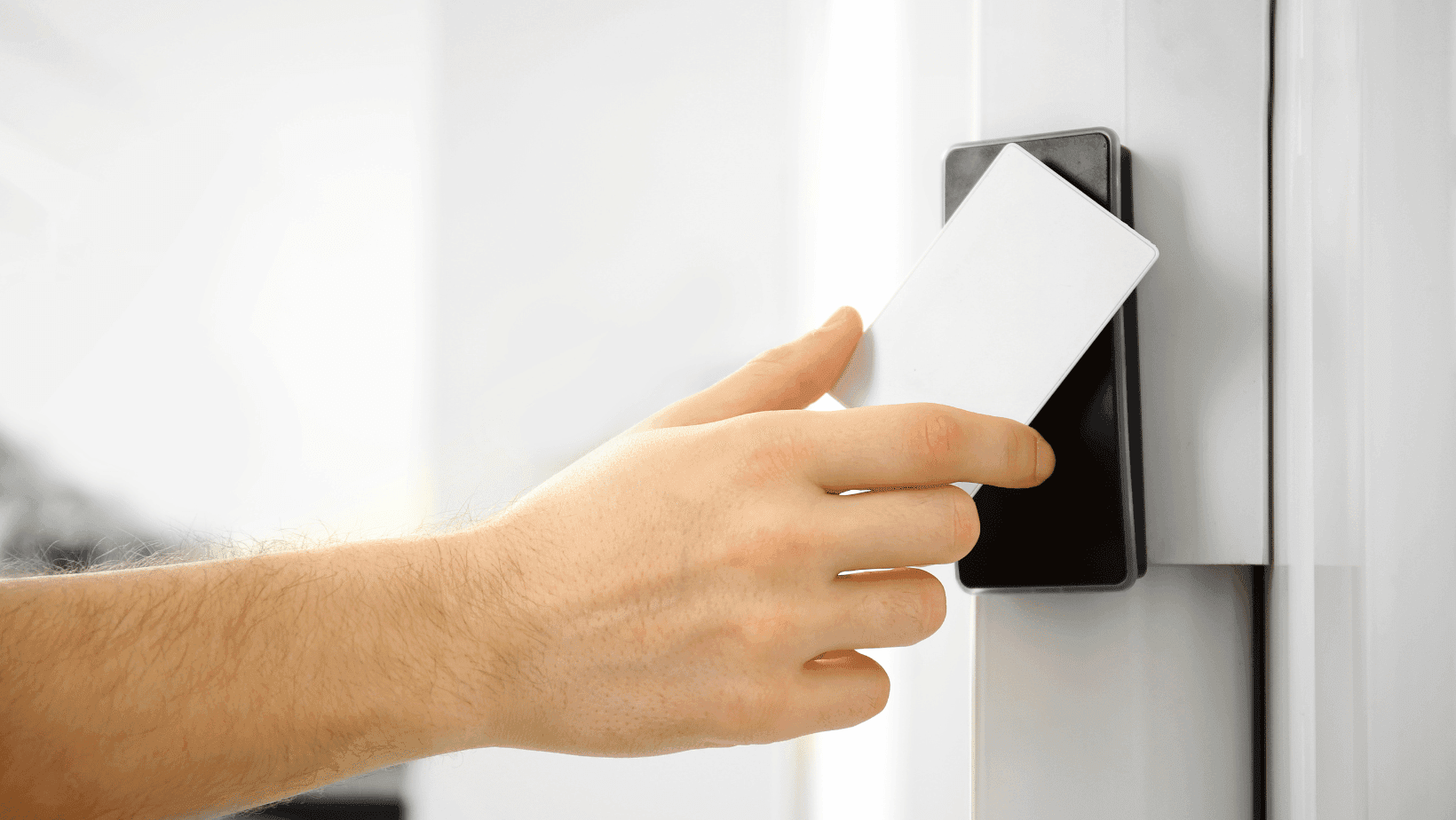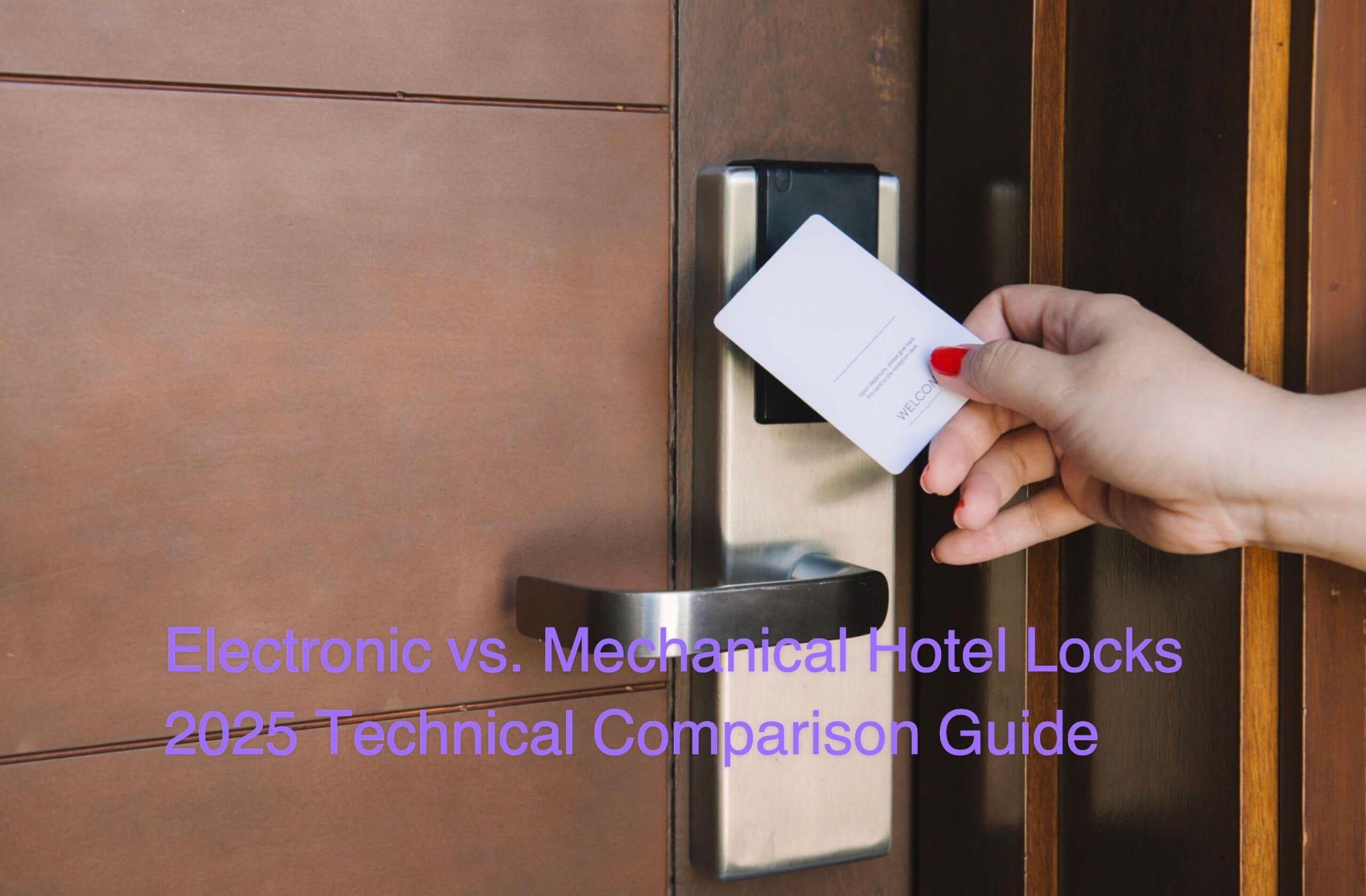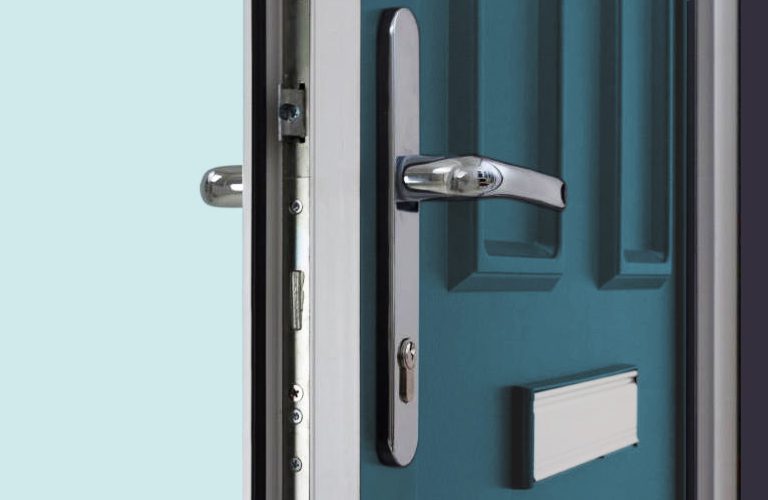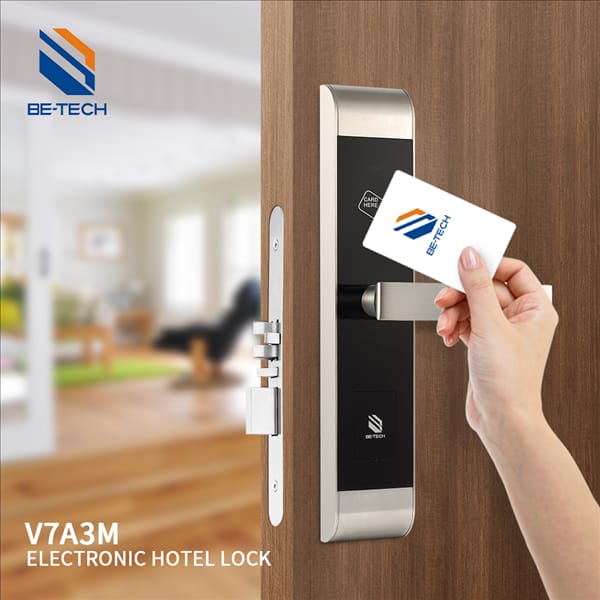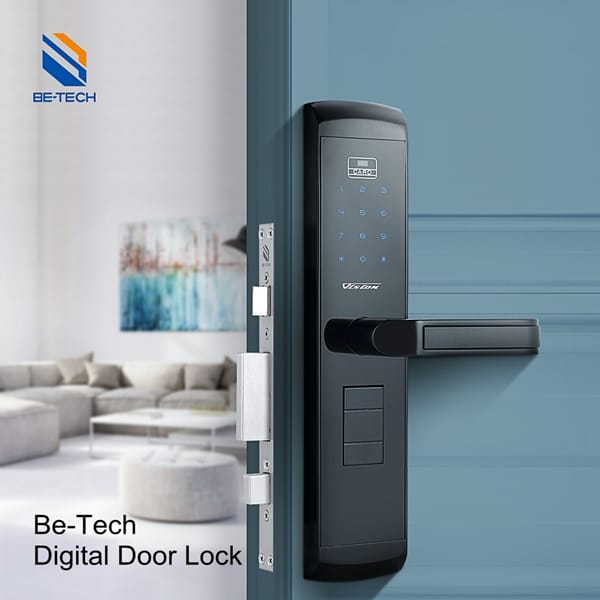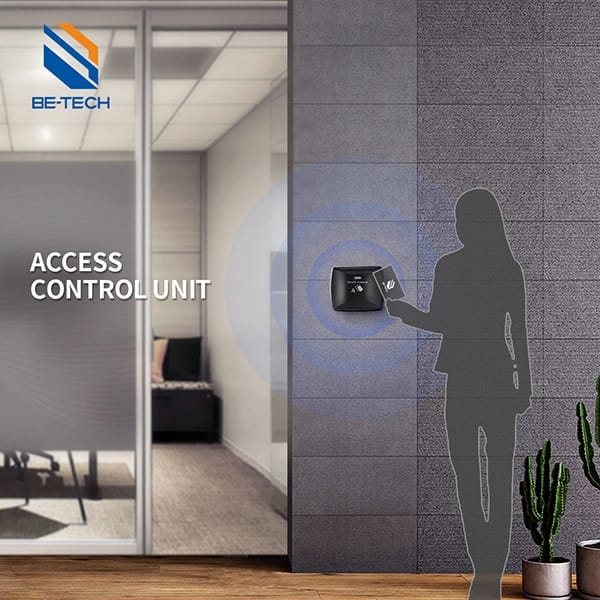In the ever-evolving hospitality landscape, hotels are constantly seeking ways to enhance guest experiences while optimizing operations. One technology that has emerged as a game-changer in recent years is the smart lock. Smart locks, also known as keyless entry systems or digital door locks, are revolutionizing the way hotels manage access control, providing a blend of security, convenience, and personalization that appeals to both guests and hoteliers alike.
The Rise of Smart Locks in the Hospitality Industry
The global smart lock market is expected to see significant growth by 2025, with a substantial portion of this growth attributed to the hospitality sector. This surge in adoption can be attributed to several factors:
- Heightened Security Concerns: As hotels face increasing pressure to ensure the safety and security of their guests, smart locks offer a robust solution. Traditional key systems are vulnerable to loss, theft, and duplication, whereas smart locks utilize advanced technologies like RFID, Bluetooth, and biometrics to provide a much higher level of security.
- Guest Demand for Convenience: Today’s travelers, especially younger generations, expect seamless and technology-driven experiences. Smart locks, particularly those that offer mobile keyless entry, align perfectly with this expectation, allowing guests to bypass the front desk and access their rooms using their smartphones.
- Operational Efficiency: Smart locks streamline many hotel operations, from check-in and check-out to key management and staff access control. This efficiency translates into cost savings and improved staff productivity.
Overcoming Challenges and Concerns
Despite the compelling advantages, some hoteliers may have concerns about implementing smart locks:
- Cost of Implementation: While the initial investment in smart locks may be higher than traditional systems, the long-term cost savings from reduced key management, enhanced security, and increased operational efficiency often outweigh the upfront costs.
- Integration Complexities: Modern smart lock systems are designed to integrate seamlessly with existing hotel property management systems (PMS) and other technologies. Be-Tech, for example, emphasizes compatibility with various hotel management systems to ensure smooth transitions.
- Guest Adoption: Guest acceptance of smart technologies in hotels is rapidly growing, particularly among younger travelers who are accustomed to using mobile devices for various tasks. Moreover, hotels can proactively educate guests about the benefits and ease of use of smart locks to encourage adoption.
Understanding Different Types of Smart Locks
The Electronic Hotel Lock Visual III RFID V5 Series is an example of a smart lock with RFID technology that utilizes RFID cards for quick and secure access.
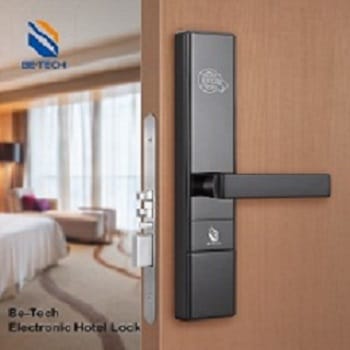
There are various types of smart locks available, each utilizing different technologies to grant access:
| Lock Type | Technology | How It Works | Benefits | Considerations |
|---|---|---|---|---|
| RFID Hotel Door Locks | Radio-Frequency Identification | Guests are provided with RFID cards that communicate with the lock, granting entry without the need for traditional keys. | Quick and efficient check-in experience. Highly secure, making it difficult to replicate access cards. | Requires investment in RFID cards and readers. |
| Mobile App-Based Locks | Bluetooth, Near Field Communication (NFC) | Guests use their smartphones to unlock doors via a dedicated app. | Enhances convenience. Reduces the risk of lost or forgotten keys. Can offer additional features like room service requests or temperature control. | Relies on guest smartphone compatibility and app adoption. |
| Biometric Hotel Locks | Fingerprint, Facial Recognition | Guests use their unique biometric data to unlock doors. | Unparalleled level of access control. Ensures only authorized personnel can enter. Eliminates the need for keys or codes. | Requires specialized hardware. May raise privacy concerns among some guests. |
| Keypad Locks | Numeric Code Entry | Guests enter a unique code on a keypad to unlock the door. | Simple and easy to use. No need for cards or smartphones. | Codes can be forgotten or shared. Less secure than other options if codes are not managed properly. |
| Electronic Hotel Lock | Various, including RFID and mobile access | Combines convenience with high-level protection using RFID, biometrics, or mobile access technologies. | Enhances security of hotel rooms. Streamlines check-in. Enables hotels to manage guest access remotely, improving staff efficiency. | Requires careful consideration of features and integration capabilities to choose the right system for specific hotel needs. |
| Electronic Hotel Door Lock | Advanced electronic mechanisms and technology | Replaces traditional keys with electronic mechanisms for enhanced security and guest experience. | Provides superior protection against unauthorized access compared to traditional locks. Features like temporary access codes for cleaning staff or maintenance personnel further bolster security. | May involve a higher initial investment than traditional locks. Requires proper training for staff to manage the system effectively. |
| Digital Keyless Entry Locks | Mobile technology and digital keys | Guests use their smartphones to unlock doors, often integrating with digital wallet apps or hotel-specific applications. | Boosts convenience for tech-savvy travelers. Reduces risks associated with lost or stolen keys. Aligns with the increasing preference for mobile-first experiences in the hospitality industry. | Requires robust cybersecurity measures to protect against potential hacking attempts. |
| Smart Hotel Fingerprint Door Lock | Biometric fingerprint recognition | Utilizes advanced fingerprint recognition technology, allowing guests to access rooms by scanning their fingerprints on a sensor. | Streamlines check-in and check-out processes. Enhances security as fingerprints are unique and cannot be lost or duplicated. Offers guests a modern and convenient experience. | May require guests to register their fingerprints, which could raise privacy concerns for some individuals. |
Key Features and Benefits of Smart Locks for Hotels
1. Enhanced Security
- Advanced Locking Mechanisms: Smart locks utilize sophisticated encryption and authentication protocols, making them significantly more difficult to bypass than traditional locks.
- Elimination of Key Duplication: With keyless entry, the risk of unauthorized key duplication is eliminated. If a guest loses their mobile key or RFID card, access can be revoked remotely without rekeying the entire lock.
- Real-Time Monitoring: Many smart lock systems provide real-time monitoring capabilities, allowing hotels to track who is entering and exiting rooms, as well as receive alerts for unauthorized access attempts.
- Audit Trails: Electronic Hotel Lock Visual III RFID V5 Series features audit trails, which track access history for better security monitoring.
2. Improved Guest Experience
- Keyless Entry: Guests can enjoy the convenience of using their smartphones or RFID cards to access their rooms. This eliminates the need to carry physical keys, reducing the risk of lost keys and check-in delays.
- Seamless Check-In: Smart locks enable mobile check-in, allowing guests to bypass the front desk and proceed directly to their rooms upon arrival.
- Personalized Access: Hotels can grant different access privileges based on guest type or needs. For instance, staff members can be given access to specific areas, while guests can access their rooms and designated amenities.
3. Increased Operational Efficiency
- Reduced Key Management: Smart locks eliminate the need for hotels to manage physical keys, reducing the time and costs associated with key cutting, distribution, and replacement.
- Automated Access Control: Integration with hotel property management systems (PMS) allows for automatic updates to guest access based on check-in and check-out times.
- Remote Management: Staff can remotely manage guest access and room assignments, improving response times to guest requests and streamlining operations.
4. Customization and Personalization
- Tailored Access: Hotels can customize access permissions for different user groups. For example, housekeeping staff can be granted access to rooms only during designated cleaning hours.
- Personalized Guest Preferences: Some smart lock systems allow for integration with guest room controls, enabling guests to set temperature preferences or lighting settings upon entry, creating a more personalized and comfortable experience.
5. Cost-Effectiveness
- Reduced Key Replacement Costs: Eliminating physical keys significantly reduces expenses related to replacing lost or damaged keys.
- Minimized Security Risks: Enhanced security features help prevent unauthorized access, minimizing potential losses from theft or security breaches.
- Improved Operational Efficiency: Streamlined operations and reduced administrative tasks translate into cost savings for hotels.
- Long-Term Durability: Investing in high-quality smart locks ensures durability and longevity, minimizing maintenance and replacement costs over time.
Choosing the Right Smart Lock System for Your Hotel
Security Features
- Encryption: Look for locks that use strong encryption protocols to protect data transmitted between the lock and the controlling device.
- Tamper Alerts: Choose locks that send notifications if tampering is detected, allowing for immediate action.
- Audit Trails: Ensure the system logs access history to provide valuable insights for security monitoring.
- Remote Deactivation: Verify the ability to remotely deactivate lost or stolen keycards to prevent unauthorized access.
Integration with Existing Systems
- PMS Compatibility: Ensure the smart lock system integrates seamlessly with your hotel’s existing property management system.
- IoT Integration: Consider systems that can connect with other devices and systems, such as security cameras or smart room controls.
User Experience
- Ease of Use: Choose locks that are user-friendly for both guests and staff. Intuitive interfaces and straightforward installation processes are essential for a positive experience.
- Multiple Access Methods: Look for systems that support various access methods, such as keycards, mobile apps, and biometric options.
- Guest Support: Provide clear instructions and FAQs for guests on how to use the smart locks. Consider offering on-site support or a dedicated helpline for assistance.
Scalability
- Future Growth: Select a system that can adapt to your hotel’s future needs, such as adding new rooms or integrating with emerging technologies.
- Flexibility: Choose a system that allows for easy upgrades and modifications to access control protocols.
Cost vs. Value
- Long-Term ROI: Evaluate the long-term value and potential cost savings associated with implementing smart locks.
- Total Cost of Ownership: Consider installation, maintenance, and potential savings from reduced key management and security risks.
- Pricing Options: Explore different pricing models and choose a solution that aligns with your budget.
Future Trends in Smart Lock Technology
The future of smart locks in the hospitality industry is bright, with ongoing innovation shaping the guest experience:
- Cloud-Based Management: Cloud computing will play a crucial role in enabling centralized control and real-time monitoring of smart locks across multiple hotel properties.
- Advanced Analytics: As smart locks generate data on room access and usage patterns, advanced analytics tools will provide hotels with valuable insights into guest behavior and operational efficiency.
- IoT and AI Integration: The integration of smart locks with the Internet of Things (IoT) and Artificial Intelligence (AI) will enable hotels to offer highly personalized experiences and automate various tasks.
- Contactless Solutions: The demand for contactless solutions will continue to grow, with mobile check-in and digital key solutions becoming increasingly prevalent.
- Biometric Authentication: Biometric technologies, such as fingerprint and facial recognition, will likely gain wider adoption due to their enhanced security and convenience.
Data Security and Privacy Concerns
As smart locks become more sophisticated and interconnected, data security and privacy become critical considerations:
- Encryption: Robust encryption protocols are essential to protect guest data and access information.
- Secure Data Storage: Smart lock manufacturers must implement secure data storage practices to prevent unauthorized access to sensitive information.
- Data Minimization: Systems should only collect and store the data necessary for operational purposes, minimizing the risk of data breaches.
- Transparency and Guest Control: Hotels should be transparent with guests about what data is collected and how it is used. Guests should have control over their data and the ability to opt out of data collection if desired.
Real-World Examples and Case Studies
Numerous hotels worldwide have successfully implemented smart locks, reaping the benefits of enhanced security, improved guest experiences, and streamlined operations:
- Havana Nha Trang Hotel in Vietnam: This hotel implemented Be-Tech’s smart lock solutions, enhancing security and guest convenience.
- Hilton Santo André in Brazil: This property adopted Be-Tech’s access control systems, streamlining operations and improving guest satisfaction.
- Deloitte’s 2022 Travel Outlook Report: This report highlights that hotels with mobile access see a 12-18% increase in direct booking revenue, demonstrating the positive impact of smart lock technology on hotel revenue.
Conclusion
Smart lock technology is undeniably transforming the hotel guest experience, offering a compelling combination of enhanced security, streamlined operations, and personalized convenience. As hotels strive to meet the evolving expectations of modern travelers, the adoption of smart locks is becoming less of a luxury and more of a necessity.
By carefully evaluating their needs, considering the various types of smart locks available, and partnering with reputable manufacturers, hotels can implement smart lock systems that not only protect their assets and guests but also elevate the overall guest experience.
To explore how Be-Tech’s innovative smart lock solutions can transform your hotel operations, contact us or visit our product page.


